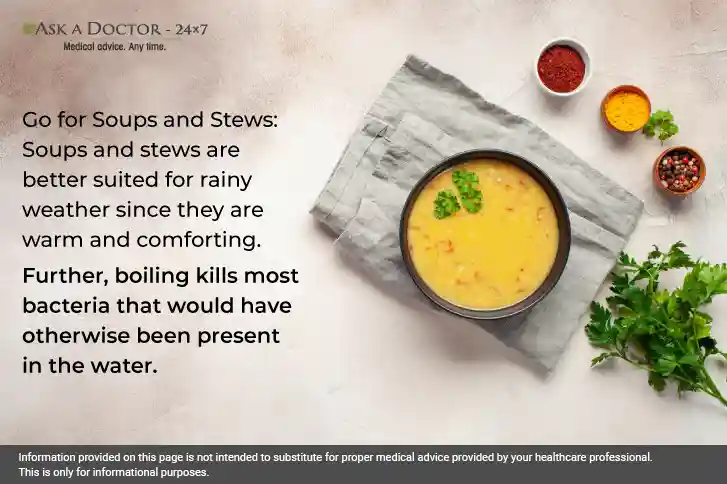Food Hygiene In Rainy Season
After the sweltering summer heat, the rainy season comes as a blessing. It surely gives relief from the heat, but the disappointing fact of this season is that it also brings various diseases and infections. Therefore, maintaining good food and personal hygiene becomes imperative to protect ourselves from the infectious diseases of the rainy season.
A lot of moisture and dampness occur during the rainy season. When this dampness gets accompanied by unhygienic, polluted, and dirty surroundings, it paves the way for the growth of viral, bacterial, and fungal infections that affect our skin, respiratory, and digestive systems. Food items, both raw and cooked, also get rotten very easily in this season, which leads to various food-borne illnesses. To help you enjoy the season fear-free, here in this blog, we have jotted down some of the hygiene behaviors to practice for food, kitchen, and personal well-being. Read on…
What is Foodborne Illness?
Foodborne illness generally refers to the illness caused by microorganisms consumed by eating any spoiled food. When people complain of food poisoning, they may have been exposed to the microorganism that causes foodborne illness. Microbes, bacteria, and pentagons are other terms used to describe the microorganism.
Bacteria or viruses generally spread easily and rapidly when they come in contact with food, moisture, and favorable humid temperature, and they begin to multiply thus leading to various infections. Their effect can range from relatively minor discomfort to more serious symptoms and manifestations such as fever, diarrhea, dehydration, and even death.
Foodborne illness can affect anyone, but it majorly impacts pregnant women, children, the elderly, and people with low immunity. By maintaining good food hygiene habits, foodborne illnesses can be prevented.
Let us read about the hygiene practices…
Food Hygiene Habits to Practice

The increased humidity of the rainy season creates ideal conditions for contamination of food and water. Here’s how we can practice hygiene habits for handling food:
Fruits & Vegetables
Fruits and vegetables easily get exposed to so many bacteria like listeria and salmonella, therefore make sure to properly:
- Clean them with fresh water before cooking.
- Do not keep cut fruits and vegetables in open areas for a longer duration during the rainy season.
- Consume cooked vegetables as soon as they are prepared and do not store them for the next meal to avoid contamination with mold and fungus.
- Consume fruits, juices, and salads immediately when they are fresh.
After washing, all fruits and vegetables should be dried properly and stored in the refrigerator.
Milk and Milk Products Hygiene
Proper milk hygiene involves correct handling and storage. Milk and milk products should be stored at appropriate temperatures to prevent the growth of harmful bacteria. It should also be kept in clean and sanitized equipment to avoid cross-contamination.
The pasteurization method can be used at home for raw milk to kill harmful bacteria.
Meat, Poultry, and Egg Hygiene
Meat and Meat products are high in protein and moisture, which are needed for the multiplication of infectious microorganisms, therefore make sure you:
- Wash your hands properly when preparing any type of meat, fish, and poultry as bacteria can quickly spread between your hand and meat.
- Use clean utensils like a knife, cooking pan, and cutting boards.
- Seal the meat in airtight packaging and keep it in a freezer if you want to store uncooked meat for a longer time.
- Don’t buy meat and meat products and seafood that are discolored have a strong odor or feel tough and slimy.
- Check for any leakage and odor if you are buying packaged meat items.
- Check egg shells properly as they should not be cracked.
Hygiene for outside food:
- Avoid precut fruits and vegetables, fried food, salad, junk food, and other street food in the rainy season.
- Street foods are generally prepared in an open area and a lack of food hygiene practices can be noticed among many street food vendors. Therefore there is a chance of contamination of food with bacteria which can lead to foodborne illnesses.
- Bakery products are also susceptible to spoilage with fungus and mold contamination due to moisture in the weather. If you want to eat, have them no sooner these are taken out of any airtight containers.
Hygiene practices to avoid waterborne diseases
Waterborne diseases are caused by microorganisms that contaminate water. Common waterborne diseases are cholera, dysentery, giardiasis, and cryptosporidiosis.
Drinking contaminated water makes people sick as it contains bacteria, viruses, and parasites. One of the primary steps in preventing waterborne infections is the consumption of safe drinking water.
Boiling water before consumption is a simple yet effective method to kill harmful microorganisms. Using water purifiers and filters can also purify water and remove its impurities. Be mindful of these steps and drink only pure water for better health and longevity.
How to maintain raw food materials in the rainy season?
Food items like pulses, legumes, spices, dry fruits, seeds, nuts, and different types of flour should be stored in a dry area. Avoid buying large quantities of raw food in this season as they can easily catch moisture that leads to the smell and nurturing of fungus, which easily damages the food items.
Kitchen Hygiene Habits to Practice
Food hygiene is very important and it starts from the kitchen. Here’s how to go with it:
- Keep your kitchen clean. It is as important as cooking with cleaned utensils and equipment.
- Disinfect kitchen area, equipment, and utensils before and after preparing food.
- Use hot water to clean your kitchen with hot water and disinfectant sprays.
- Clean your daily use products such as refrigerator, microwave, mixer, juicer, chopping board, knife, and other equipment every day. An unclean refrigerator might become a breeding place for fungus or harmful germs.
- Cook fresh food for each meal and avoid storing food as left-over foods can get contaminated quickly in this weather.
Personal Hygiene Habits to Avoid Foodborne Diseases
Personal hygiene is a must for our overall benefit and health. To maintain healthy personal hygiene make sure to:
- Wash hands with soap, and clean portable water before and after handling food.
- Tie hair before cooking.
- Make sure your nails are cut short and clean.
- Wear a clean and preferably cotton cloth, apron while cooking.
- Do not use gadgets like phones or remote control during cooking.
Conclusion
Every time washing hands before and after preparing and eating food is a good habit. Water used for cooking and washing should be clean. Fruits and vegetables should be washed before use. Prepare food in less quantity and keep leftovers in the refrigerator to avoid getting contaminated. Avoid consuming raw and deep-fried food items from outside. By following all these hygiene habits, many infections can be avoided.
If you have any food-related queries or you’re looking for delicious quick meals for the rainy season, Ask a Dietician/Nutritionist online.
Recently Answered Questions Related to Food Hygiene and Associated Illnesses
- Weight Loss After Having A Food Poisoning Episode. Need Help
- Swelling In Intestine, Mild Pain While Passing Stools, Food Poisoning Detected, Taking Spasmelan Thrice A Day, Stopped Same Symptoms, Any Treatment?
- Breathing Difficulty, Throat Closing Up After Meal, Headache, Stomach Cramps, Diarrhea. Reason, Treatment?
- Diarrhea, Bloating, Loss Of Appetite, Belching, Weight Loss. What Could It Be?
- Neon Yellow Bile Vomiting Followed By Pale Stools After Excessive Eating Of Oysters. Temporary Side Effects of Food Poisoning?
- What Causes Nausea, Vomiting, Headache And Fatigue?
- Is Antibiotics Necessary For Food Poisoning?
- Stomach Pain With Vomiting. Food Poisoning? Going Through Menopause. Taking BP Medication
Disclaimer: Information provided on this page is not intended to substitute for proper medical advice provided by your healthcare professional. This is only for informational purposes.
Ask a Specialist
Recent Questions


